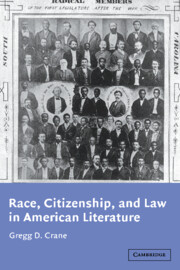Book contents
- Frontmatter
- Contents
- Acknowledgments
- Introduction
- Chapter 1 Higher law in the 1850s
- Chapter 2 The look of higher law: Harriet Beecher Stowe's antislavery fiction
- Chapter 3 Cosmopolitan constitutionalism: Emerson and Douglass
- Chapter 4 The positivist alternative
- Chapter 5 Charles Chesnutt and Moorfield Storey: citizenship and the flux of contract
- Notes
- Index
Chapter 2 - The look of higher law: Harriet Beecher Stowe's antislavery fiction
Published online by Cambridge University Press: 22 September 2009
- Frontmatter
- Contents
- Acknowledgments
- Introduction
- Chapter 1 Higher law in the 1850s
- Chapter 2 The look of higher law: Harriet Beecher Stowe's antislavery fiction
- Chapter 3 Cosmopolitan constitutionalism: Emerson and Douglass
- Chapter 4 The positivist alternative
- Chapter 5 Charles Chesnutt and Moorfield Storey: citizenship and the flux of contract
- Notes
- Index
Summary
Appalled by the kidnappings of African Americans in the wake of the Fugitive Slave Law and with few alternatives as a woman for voicing her opposition, Harriet Beecher Stowe turned to fiction as a way to change the direction of the nation's law by prodding its conscience. Stowe's sense of the political power of literature is expressed in a letter she wrote to Lord Denman (formerly the Lord Chief Justice of England), urging the English to take up literary cudgels against American slavery: “In your reviews[,] in your literature, you can notice & hold up before the world, those awful facts, which but for you, they would scornfully go on denying as they have done.” Modestly admitting that law was “not her work” or her “field,” Stowe, nonetheless, was sure that amateur or literary jurisprudential efforts could lead to institutional revision: “It seems to me, that this tremendous story cannot be told in the civilised world, without forcing attention.”
Stowe's belief in the power of women's literary efforts, in particular, to mold public opinion and shape public policy was not without precedent. Lydia Maria Child's An Appeal in Favor of that Class of Americans Called Africans (1833) helped to convince future senators Charles Sumner and Henry Wilson, as well as Wendell Phillips, William Ellery Channing, and Thomas Wentworth Higginson of the injustice of slavery and racial discrimination.
- Type
- Chapter
- Information
- Race, Citizenship, and Law in American Literature , pp. 56 - 86Publisher: Cambridge University PressPrint publication year: 2002

